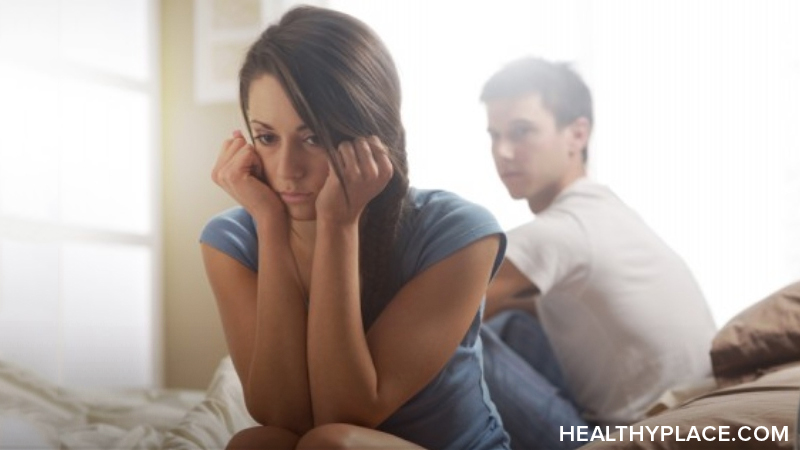Depression from Relationships: 5 Signs It’s Depressing You

Relationships are one of the most impactful areas of life, so depression from relationships can take its toll on your wellbeing. It can be tough to pinpoint precisely how depression comes about and why. Sometimes there is no reason for depression, while other times depression can occur as a result of loss, grief or physical or emotional trauma (situational depression). So how do you know whether your depression is impacting your relationship or your relationship is depressing you? Read on to find out if depression stems from your relationship.
Relationship Depression: How to Tell Depression from Normal Relationship Troubles
Depression from relationships is possible but it’s important to note that depression and relationship troubles are not the same. While you may feel sad, hurt or angry because of something that happened in your love life, that doesn't mean you are depressed. Depression (or major depressive disorder) is a clinically-recognized condition that refers to feelings of despondency, sadness and low mood for at least two weeks at a time.
Relationship troubles or trauma can lead to major depression, especially if you are genetically predisposed to the condition. Depression varies in severity, but the classic symptoms of depression include:
- Changes in appetite
- Difficulty sleeping or sleeping too much
- Fatigue
- Difficulty concentrating or making decisions
- Feelings of worthlessness and negativity
- Thoughts of self-harm or suicide
If you’re concerned about yourself or your partner, you can call the 24/7 Suicide Prevention Lifeline (1-800-273-8255).
5 Signs Your Relationship Is Depressing You
Studies show that 60% of those with depression consider their relationships to be the cause of their illness. Here are the signs that your relationship could be contributing to your depression.
- You have lower self-esteem since the relationship started
A key sign of depression from relationships is low self-esteem because your partner puts you down or makes you feel bad about yourself. It may be subtle behaviors such as never showing an interest in you or socializing with your friends, or it could be outright insults that damage your sense of self-worth.
Try to examine how you feel around your partner and whether this is different from how you feel when you spend time with others. Remember how you felt before you began the relationship – were you more confident or outspoken? Did you feel more like yourself? If the answer is yes, it may be time to examine whether your relationship is contributing to your depression.
- You feel like your partner is trying to change you
Feelings of lost identity are common among people with depression. But if you feel your sense of self slipping away because of your partner, that is a sure sign that something is wrong in your relationship and could contribute to relationship depression. Women and men in emotionally or physically abusive partnerships are afraid to be themselves because they’re often told this isn’t good enough, or else the expectations on them are too high. If this sounds familiar, it may be time to walk away.
- Your relationship lacks physical intimacy
According to a 2013 report, people who are “affection-deprived” are more likely to experience depression and stress, as well as a whole raft of other health conditions. Physical intimacy doesn’t always mean sex, but your partner depriving you of kisses, cuddles and touch could well be contributing to your depression.
Physical intimacy can fall by the wayside for many reasons, and it doesn’t mean your relationship is doomed to fail. Our increasingly busy lives mean we don’t always have the time or energy to connect in meaningful ways. Talk to your partner about how you feel without attributing blame. Suggest that you both try to be more tactile. If the problem persists, seeing a couple’s counselor could provide a way forward.
- Your independence is slipping away
Freedom to enjoy your hobbies, interests and social activities is crucial to maintaining good mental health. If your partner is overly codependent or makes you feel like you can't do things on your own, this is a major red flag. Controlling behavior in relationships varies in severity. While some partners may merely be anxious or insecure when it comes to being apart, others will try to make your life smaller as a way of asserting control over you.
They key here is communication. Talk to your partner and explain that your lack of independence is contributing to your depression. Your partner should be understanding and supportive of your need for space, even if they express some anxieties of their own. If your partner shuts you down repeatedly or refuses to listen, you need to consider whether this is the right relationship for you.
- You argue constantly
The last sign of depression from relationships is that you argue constantly with your partner. All couples argue from time-to-time, but if you can’t get through a simple discussion without snapping at one another, this is a sign that all is not well. Daily conflict is exhausting, and it could well be contributing to your depression – especially if you feel stressed or anxious at the thought of spending time together.
If you think that your relationship is causing or contributing to your depression, something needs to change. Sometimes when it comes to depression and relationships you need to say goodbye. No relationship is worth sacrificing your mental health, so if these problems are persistent, it may be time to walk away.
See Also:
APA Reference
Smith, E.
(2022, January 3). Depression from Relationships: 5 Signs It’s Depressing You, HealthyPlace. Retrieved
on 2026, February 3 from https://www.healthyplace.com/depression/relationships/depression-from-relationships-5-signs-its-depressing-you



